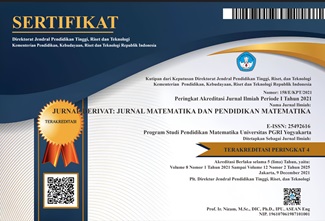Pengembangan Bahan Ajar Trigonometri Dengan Pendekatan RME Berbasis Aplikasi Schoology
DOI:
https://doi.org/10.31316/j.derivat.v5i1.142Abstract
This study aims to determine the benefits of teaching materials based on the application of Schoology in the course of trigonometry in the lecture. One of the hallmarks of Schoology-based teaching materials is to use the Schoology app which is one of the web-based social web pages which offers the same learning as in a class free and easy to use. Through Schoology, the management of learning is very easy. Schoology is also almost the same function with other web pages in which it offers lecturers to load materials, learning materials, structured quizzes. This research is a kind of research development. Research methodology used as follows: (1) research and information gathering, (2) planning, (3) product development, (4) initial test, (5) product revision, (6) field trial, (7) field trial products, (8) product operational trials, (9) product revisions and (10) implementation. The achievement of this research is teaching materials based on Schoology which can support lecturer of trigonometry in the mathematics education program. This teaching material is feasible to use and the achievements generated in the development of teaching materials based on this schoology is to improve students' learning outcomes in trigonometric courses.
Keywords: development, Â teaching materials, schoology, trigonometryDownloads
Published
Issue
Section
Citation Check
License
Authors who publish with this journal agree to the following terms:
-
Authors retain copyright and grant the journal right of first publication with the work simultaneously licensed under a Creative Commons Attribution-ShareAlike 4.0 International License that allows others to share the work with an acknowledgment of the work's authorship and initial publication in this journal.
- Authors are able to enter into separate, additional contractual arrangements for the non-exclusive distribution of the journal's published version of the work (e.g., post it to an institutional repository or publish it in a book), with an acknowledgment of its initial publication in this journal.
- Authors are permitted and encouraged to post their work online (e.g., in institutional repositories or on their website) prior to and during the submission process, as it can lead to productive exchanges, as well as earlier and greater citation of published work (See The Effect of Open Access).







